#either peter or john or judas i beg of you
Text
Be unpredictable. Always make sure they don't know your next move. Like blorborizing GoodOmens!Jesus before the show is even renewed.
#good omens#good omens s2#good omens 2#for all intents and purposes i must violently impress that this is a joke#but IS IT????#yelling “YOU DON'T GET HIM LIKE I DO !!!!!” like those fans who are considered THE authority over a certain character#except I dont have that authority and on top of that sound like a fucking moron.#the fact that Jesus will be blorborized soon is a novelty to me#they better give him a boyfriend i swear to god#either peter or john or judas i beg of you#this show is literally the yassified bible where everyone is queer if judas doesnt show up then what's the point#again another joke 😭😭😭
24 notes
·
View notes
Text
Name:
Type: part six through seven of Judas' betrayal
Requested: technically yes
Theme: Begging you to come help [Stitches by Shawn Mendes]
Warnings: same as the others, mentions of death, TONS OF ANGST
...
'Mary hadn't seen y/n for almost a week. And y/n claimed to be going to visit her.' John thought, kicking a pebble while walking down the road. 'What have I missed?'
"Oh, shalom, John!" He heard Ramah greet. He greeted her back, not looking while walking faster. "John?"
He grumbled, "Have you seen y/n?"
Ramah tilted her head, trying to think back. "Now that you mention it, I believe that I have. She didn't seem like she was in the best mood, and honestly-"
"Did you see where she went?" John interrupted. She looked at him shocked. "Is she coming in the direction of Mary's house?"
"No, in the opposite direction...." Ramah paused. "towards Judas' old house?" John left without saying a word, but Ramah followed him anyways. "Is she alright?"
"Get the others and meet me at Judas' old house." He shouted running off.
"Wh-alright?"
...
"So, why did you need us?"
John turned to the sound of Simon Peter. Along with him were Eden, Andrew, Philip, Big James, Zebedee, Mary Magdalene, Simon Z, Matthew, and Thaddeus.
"We need to look for y/n."
"You lost her?" Zebedee exclaimed. "Honestly, John! I thought she was going to lose you instead."
"It's a long story, abba." Big James whispered to him. "John, the others stayed behind in case she came back. Tamar and Ramah are at Mary's house, and eema and Mary are at home." He filled in his brother, who nodded.
"I feel responsible." Thaddeus apologized. "I should have gone with her."
"It's not your fault, son." Zebedee told him. "It's John's."
"That's not helping." Andrew mumbled, as Philip elbowed him.
"Alright-" John started to say, but Zebedee cut him off.
"Everyone divide themselves up. John, I want a word."
...
PART SEVEN
...
"John, honestly what's going on. You've never acted this way!" Zebedee quietly exclaimed to his younger son. "And neither has y/n. She's always been the ray of sunshine and now is missing. The Lord only knows what is going on in her mind." John swallowed hard as his abba put a comforting hand on his shoulder. "What happened between you two?"
"She kept saying that this - all what happened - was all her fault. I don't know why she'd ever think that, either."
"Did you ask her?"
"N-no, not....not really."
"Son, I don't know how you ever got this far in a marriage," John looked at Zebedee unimpressed. "but, you know her the best. Where would she go?"
John thought for a minute before in dawned on him.
...
Mary and Eden ran closer to the sea.
"This is the spot that I found her when her mother had died. Y/n has to be here." Eden breathed, Mary following close behind.
"I would've guessed here, too." Mary responded. "Her husband is a fisherman after all."
They were both right. Y/n was watching the tide, her vision blurred with cold tears.
"Y/n, John-" Eden started.
"No, I'm not going back." Y/n sharply cut in. "I can't face him. I can't face any of them, especially if they knew what I know. What I could have done."
"No one is going to fault you for Jesus' death." Mary gently said, hugging her shoulders. "Ramah, Tamar, Mary, Eden. No of us. Your husband, especially."
"I could have prevented this!" Y/n sobbed. "I saw a letter from Judas before he gave it to the Romans. I could have prevented all of this."
Eden covered her mouth. "You knew this whole time?"
"Yes. But Judas had threatened me that if I told anyone..." but she stopped to take a breath. "Anyone......about."
Mary stopped her. "You could have at least said something about the threat."
"No, you don't understand! He made it so I couldn't say anything about our conversation!" Y/n wailed, burying herself into Mary and Eden.
"Y/n, let's talk somewhere else, alright? How about my house?" Eden offered. "No one has to know yet."
9 notes
·
View notes
Text
into the Ogata fray
Hello Golden Kamuy peeps on tumblr, I’m toeing into the fray in regards to the most talked about character (in my humble opinion) Ogata. Apologies this is a bit long but whatever.
As work is about to get a lot busier in about a week, I figured I gotta do this now or never so here goes nothing. Also, I’d love to thank the peeps who have been having a great dialogue on this already I’m looking at #hundredogatas and #goldenkamuyhunting for some great analyses.
I already posted some of my comments over on Mangadex in regards to chapter 165, Flag Bearer, trying to wrap my head around Ogata’s motivations and his role in the series.
I’ve really taken to the idea that Ogata is a fundamentally hurt character who has been hurting for so long that he doesn’t even know it anymore. He had normalized his “abnormal” feelings. As a result of his normalization to this he became in a ways “dead” to a lot of things, I agree with many others that he does have feelings but he keeps them buried deep down for the most part and the occasionally bubble to the surface.
The first instance of his feelings/humanity bubbling up are quite early on. Others have already highlighted he did not kill Huci or Osoma when going after Tanigaki. He is quite clear that he does not believe in unnecessary violence or actions. The second time this pops up is in the showdown in Barato. He saves Shinpei the gangster son and even though he calls him a weakling he is the one who allows him to be free of his meddling parents and move off on his home. Yes, he’s drawn as a tough character but you see no malice or meanness in his expression, just a straight up explanation that he doesn’t like people who lack action or volition. I felt he was just making a very firm point.

Throughout the series, I’ve always read Ogata as an individual who views himself as a self made man. He rose to his position as a Superior Private through skill and hard work and in part by not making too many waves. He highly values individuals who take control of their lives and their actions and have some sort of purpose; the people he dislikes the most are those who rose by family/title/rank which is obviously due to his horrible childhood/father issues that left him realizing that the concept of noble blood is pointless, especially given the fact that his own father made terrible military decisions.
I feel that Noda-sensei likes to have his humanity bubble up occasionally and Asirpa will be the character who pulls it back to the surface due to her parallels with his brother.
As he is an astute observer of his surroundings and what we know of Lt. Tsurumi’s ability to manipulate people for his best outcomes I hypothesize that he recognized the “deadness” in Ogata and wanted to groom him to be the elite dirty deeds man of his select group from the 7th. Tsurumi just keep pushing him further, first trying to get at him through his brother and then to assassinate his father. Tsurumi thought he had groomed the ultimate stealth man for his future jobs. These two parts of pages from ch. 165 just really highlight how “checked out” he was as a sniper in the trenches. You could almost hear Ogata’s internal dialogue as “another day, another kill, another paycheck”.
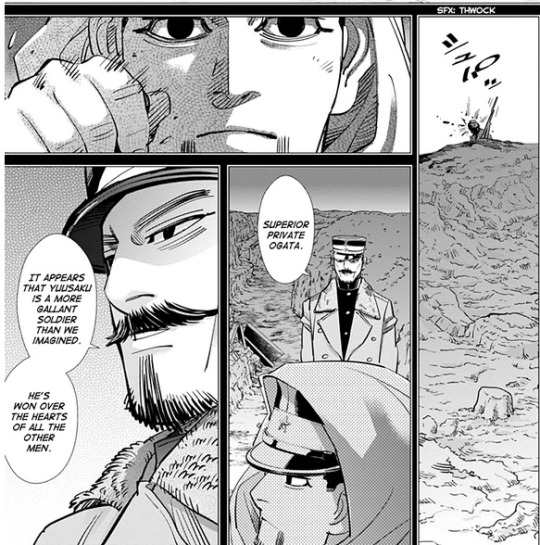

This entire scene is so sterile, he takes his sniping very seriously but he’s so distant that he’s in his no emotion zone.
When ch. 165 gives the flashback with him and his brother discussing their roles on the battlefield and how he can’t get his hands dirty for the sake of his honor and their own father’s crazy ideas, I still feel torn on the situation. I agree that Ogata’s brother loved and valued him as a human being and as he observed his brother closely (in the revised ch. 103) he did see that his brother had qualities that he lacked. But I’d be as pissed as I’m guessing Ogata was at how hypocritical this point was to him. It was almost as though it was egging him on to “go ahead and shoot” just to beat his brother in a philosophical argument to get back at their father.
While trying to put things in chronological order, I feel that Ogata reached his breaking point with Tsurumi’s manipulation of him after he killed his father.
Here we have him thinking maybe shooting my brother might be a bad idea but i’m still hesitating just sooooo slightly with that just slightly less dead look . . .
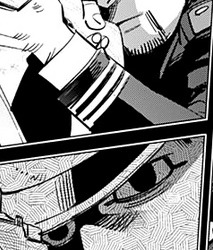
to his oh you smooth talking bastard fake smile. Granted this is from the original ch. 103, but I think it really gets the point across that he knows he’s been played and he’s hyper aware of the power Tsurumi wields over others.

I take it from this point on his goals began to differ and lead to him deserting. I think it took a long time for him to feel confident that he could leave. It was clear he at one point did feel intimidated by the power Tsurumi had over him based on how awkward his body language with Tsurumi was in ch. 164. He’s totally informal when he’s sitting 99.9% of the time, yet he sits in seiza and buttons up his uniform.
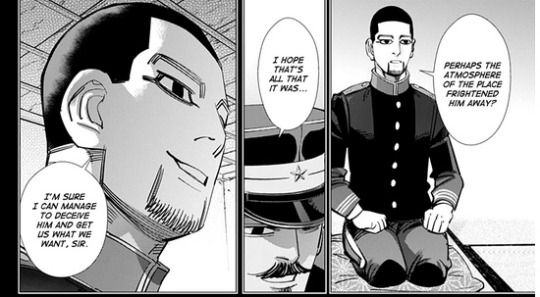
Here is his more informal, I’m totally hogging the heater while observing everyone around me/listening to Tanigaki’s story.
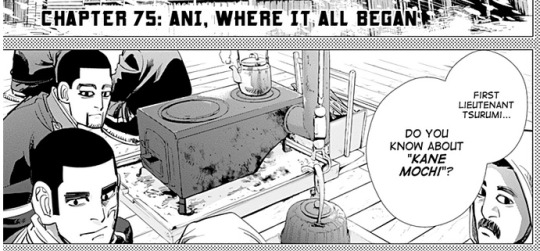
After he leaves the hospital he is now in his “liberated” form which is shown by his longer hair. According to Noda-sensei in questions from readers in Young Jump that were translated by the peeps over at Kamuy Central, Ogata grew his hair out as he had become liberated. What he was liberated from was unclear but it was a physical sign that he had changed somehow. It is clear that his character has a beef with the military hierarchy and how many men died to poor decisions - which we later learn were his father’s to an extent. This is early on when he’s discussing the type 30 rifle while sniping Tanigaki and how he continues to disagree with the whole “noble blood” line repeated by Tsurumi and backed by Koito to an extent. With his new hairstyle he definitely expresses himself more to the other characters while he maintains his distance.
His immediate interaction with Hijikata is both pay attention to me and praise me (shooting the watchtower bell/skin on his head) but also, I’m gonna push you and sass you with my confidence b/c I know things. Plus, he immediately makes a cutting remark about “what happens to your subordinates?” If he were totally dead on the inside or missing his humanity he wouldn’t ask about the little guys being lead by Hijikata. Again, I think this hints at his dislike of unnecessary violence.
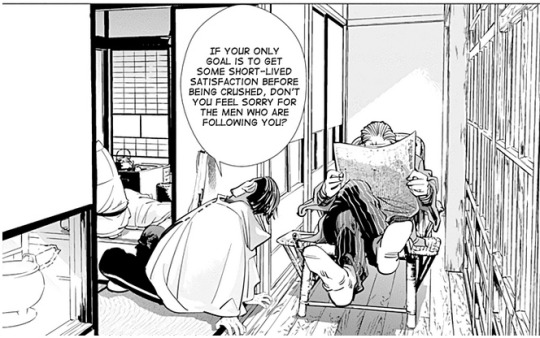
We know he has issues with crappy fathers/poor leaders of people. The angry screentones not only when Hijikata cuts off Asirpa from speaking but how he’s like she was about to say my father . . .
As a keen observer of people, he’s looking out for leadership qualities either actively or maybe even passively. I’d like to make a really big leap for a minute and point out the cover to ch. 71
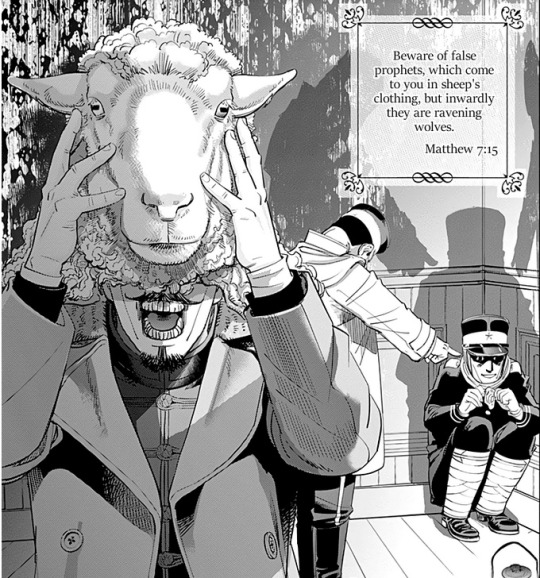
This cover has a quote from Matthew and features Tsurumi as the false prophet with Tsukishima and Nikaido. Note that in the “Last Supper” scene here (ch. 81)
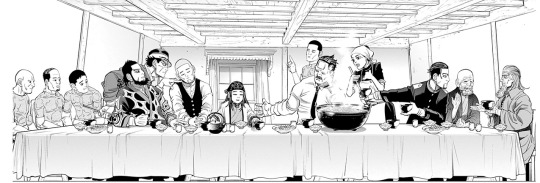
Ogata is in the place of Matthew. If we go with the Asirpa is Jesus hypothesis, saving men with dark pasts to redeem themselves than I don’t think Noda-sensei just picked a quote from Matthew at random. Keep in mind Kiro is Judas, Sugimoto is Peter and Shirashi is John. Also remember that Matthew was a tax collector and not trusted or accepted by others but Asirpa clearly cares about him through the series. This leaves Ogata as the only person to argue against Tsurumi based on his shootout with Tsukishima in the taxidermists place as shown here
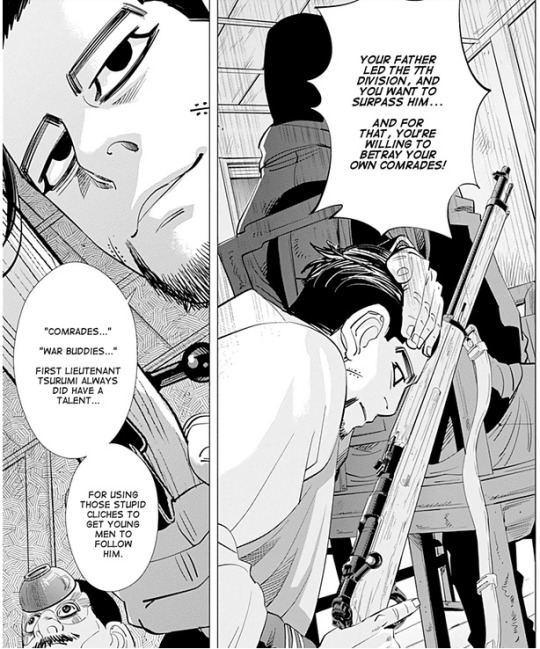
He is clearly telling Tsukishima that Tsurumi used these sentimental things to get men to follow him and dedicate themselves to his cause. We learn much later that there is no way his motivations are based on surpassing his father - that was always a line Tsurumi told others but he does admit the he never knew what Ogata was thinking.
Anyhoo that was my really far reach, but getting back to his idea to keep his distance from people but ultimately wants to be loved aspect. I’d state that Ogata hides some of his feelings towards others through is constant jests or teasing, despite having a hard time accepting that Tanigaki didn’t kill his comrades (who he def cared about a lot, which seems out of character at first) he gave Tanigaki the nickname “bear cub” and it stuck with others calling him that. He also snarked at Tanigaki that if he wanted his nose cut off so badly he could do it for him. I don’t think he meant this but it is clear he hides behind is sassy/sarcastic remarks. As Tanigaki is the most innocent (and most similar to his brother) i’d say this spills over into his first harsh sadistic attitude towards him “beg for my help!” to “the dog did more than you.” to the harsh but in some ways likely true/protective “go back home”. He says one thing but his actions speak otherwise just like the gangster son back in Barato.
Despite bitching about Sugimoto slowing them down while fleeing the 7th, he lets Asirpa treat him here
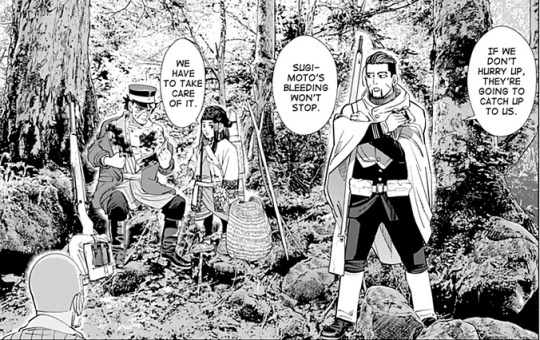
He’s being a bit pissy and I love the arms crossed body posture but you can tell he’s just being pushy to make sure they don’t get caught.
My absolute fav scenes of how he keeps his distance are the beach ones here where everyone holds hands and jumps while he watches over them.

Which then highlights him in the background several panels later while Asirpa and Sugimoto talk about beach kamuy etc.

He frequently is shown with his back towards many other group members, which would imply trust to an extent, he expects them not to stab him in the back so to speak. When he shoots the herd of reindeer he states that they are just like people with one on the lookout - in the groups that he has been a part of he’s the lookout.
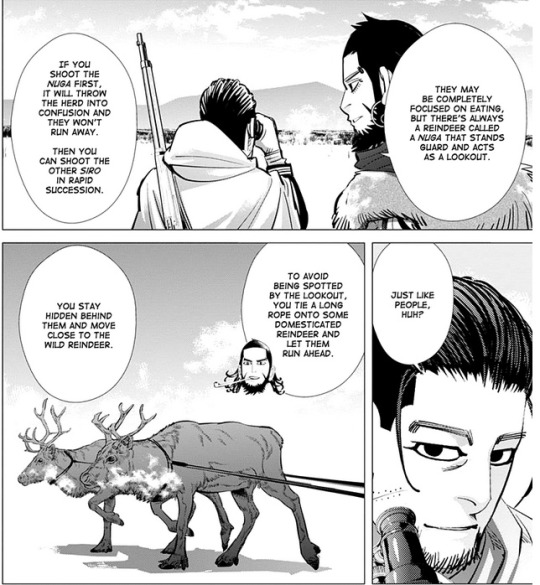
He may be alone and isolated but he’s always playing an important protective role towards others. I’m not sure to what extent he realizes that he does this but he’s almost always drawn looking back while others are looking forward or looking the opposite direction of the rest observing everything. He def is a protector of others, especially those who cannot fully protect themselves.
Ever since the beginning of the series we’ve know most character’s motivations for the gold but his remains a complete mystery. Another tumblr post mentioned it could be the geisha debt that his mom had that he inherited, which makes sense to me, but really we still don’t know why he even joined the military. Being a solider wasn’t going to be enough at the rank of a superior private to pay off that debt . . . . I want that question answered for me - yes, it was clear he was a sharpshooter from a young age but he clearly could have been a successful hunter instead of a solider. I hope we get answers to this in the manga.
As others have stated, since he was the only character to really respect Asirpa from the get go other than Sugimoto and that they are clear foils of how different people deal with PTSD, our current story arc will hopefully work in how Asirpa will save him by treating him like a real human being and in return he will protect her from older men/the establishment from using her. For most of the series Ogata and Kiro were separated and we know that he knows more about Kiro than Kiro likely realizes. The benefit of being a quiet introvert means a lot of the characters don’t notice him or read him as well as they could.
These recent panels highlight how he actually gets Shirashi and Asirpa to realize something is off and it likely has to do with Kiro. I love how he gets Asirpa to realize they were being targeted for a reason and that stressed out look on Kiro’s face is so perfect.

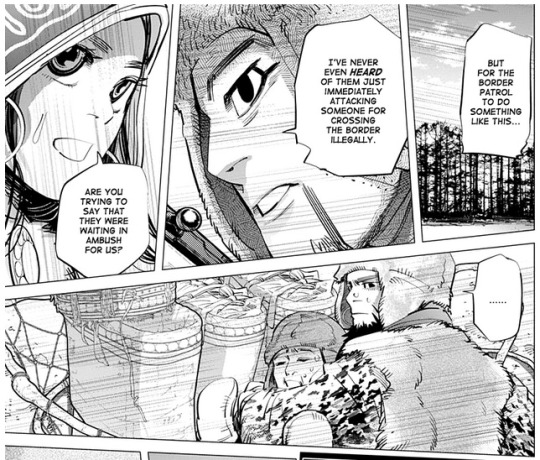
Ogata knew that both Tsurumi and Hijikata knew of the links to the partisans in the far east and that Wilk and Kiro were linked. He just needed to clue in the nicer party members to this fact. He had to betry Sugimoto to get close to Kiro for him to play his hand. He’ll protect Asirpa b/c that’s what he does.
I could go onto some other points but I should stop here. Phew. I think I could leave those for later posts. Like how he shows affection through teasing ALL the TIME.
110 notes
·
View notes
Text
Does God Want To Be Able To Suffer?
By far, the writings I carried out that are actually the top selling for the open minded and enraging for women enjoy that frame of mind a lot less, have been getting Questions Your Pastor Will Hate. Many appreciate the questions and admit that everybody have had the same questions when he sincerely study the text of the Bible stories and accounts of varied topics. These will be the people who see the politics behind the scrolls. They admit that James and Paul really did bash heads and Peter was bashed by Luke and John as an individual who was totally unworthy virtually any authority your past church. Judas had betrayed Jesus and Peter had denied him, so that's pretty much the end of them in the eyes of John, Luke and Paul.
When talking of my family, a practice that utilizes me often that I set aside one hour a day for my spouse. We spend this time together, alone, where she when i just sit down, relax, and regarding God, life together, the children, and our future. Pastors, who can't even begin to express how crucial a good marriage covers the their ministry, need the support of their spouse, and spending time with them is important.
For the ministers who go around 'begging' for money on the social networks, it ideal for that they stop common. Let them learn to depend on God. This is not a clich but the reality that all ministers need face. If what perform is God's work, additionally will surely provide.
It can be a good scheme to put together an a small amount of songs apart, just if it turns out you need them. So, when you choose out the songs for the service, do not want have Pastor Reality to play them every single one of! Click here for more information: Larry Reid Mentor
To sit back during one particular sessions generally communicate either weakness of lack of spirituality! The truth is it likely conveys cramps and easy. Any fool could see this kind of is not suitable, but apparently not some worship leaders, who continue to boost worship times to the max.
The action is the most critical step, and everything gets underway with prayer. If you find that the Lord is leading you within ministry career, ask God to guide your path and lead your . Jeremiah 29:11 states "For I the many plans I've for you declares the Lord, gives prosper your own family not to harm you, plans to present you with hope in addition to future." Is definitely clear that the Lord has plans for everyone, and your particular plan could be to serve the Lord in youth ministry.
Maybe my sharing this piece of my life will develop a change within your life permits allow for you to see God in a different way. We have an associated with choices become worse every week.
0 notes
Photo

THE CATHOLIC EPISTLE OF ST. JAMES, THE APOSTLE - From The Latin Vulgate Bible
Chapter 1
ON THE CATHOLIC EPISTLES
PREFACE.
The seven following Epistles have been called Catholic or general, not being addressed to any particular Church or person, if we except the Second and Third of St. John. They are called also Canonical, having been received by the Church as part of the canon of the New Testament, and as writings of divine authority... The first of the seven epistles was written by St. James, surnamed the lesser, and James of Alpheus, (Matthew x. 3.) one of the twelve apostles, called the brother of our Lord, (Galatians i. 19.) who was made bishop of Jerusalem. His mother is thought to have been Mary, sister to the blessed Virgin Mary, and to have been married first to Alpheus, and afterwards to Cleophas; to have had four sons, James, Joseph, Simon, (or Simeon) and Jude, the author of the last of these epistles. All these four being cousins-german, are called brothers of our Lord, Matthew xiii. 55... This epistle was written about the year 62.[A.D. 62.] The chief contents are: 1. To shew that faith without good works will not save a man, as St. Augustine observed, lib. de fid. et oper. chap. iv.; 2. He exhorts them to patience, to beg true wisdom, and the divine grace; 3. He condemns the vices of the tongue; 4. He gives admonitions against pride, vanity, ambition, &c.; 5. To resist their disorderly lusts and desires, which are the occasions and causes of sin, and not Almighty God; 6. He publisheth the sacrament of anointing the sick with oil; 7. He recommends prayer, &c. St. Jerome, in a letter to Paulinus, (t. iv. part 2, p. 574.) recommends all these seven epistles in these words: James, Peter, John, and Jude, published seven epistles....both short and long, short in words, long as to the content; Jacobus, Petrus, Joannes, Judas, septem epistolas ediderunt....breves pariter et longas, breves in verbis, longas in sententiis. (Witham)
Chapter 1
The benefit of tribulations. Prayer with faith. God is the author of all good, but not of evil. We must be slow to anger; and not hearers only, but doers of the word. Of bridling the tongue; and of pure religion.
1 James, a servant of God, and of our Lord Jesus Christ, to the twelve tribes which are dispersed, greeting.
Notes & Commentary:
Ver. 1. James, a servant of God, and of our Lord Jesus Christ. Some have doubted whether the author of this epistle was St. James, the apostle, because he does not call himself an apostle. By the same weak argument we might reject all the three epistles of St. John and his Apocalypse, and the epistle of St. Jude. Nor does St. Paul give himself this title in those to the Thessalonians, to the Philippians, to Philemon, or to the Hebrews. --- To the twelve tribes, which are dispersed. Literally, which are in the dispersion. That is, to the Jews converted in all nations. --- Greetings.[1] Literally, salvation. Which comprehendeth much the same as, when St. Paul says, grace, peace, mercy, &c. (Witham)
Note 1:
Ver. 1. Salutem, chairein, salvari, salvos esse.
2 My brethren, count it all joy, when you shall fall into divers temptations:
Ver. 2. Into divers temptations. The word temptations, in this epistle, is sometimes taken for trials by afflictions or persecutions, as in this place; sometimes for a tempting, enticing, or drawing others into sin. (Witham)
3 Knowing that the trying of your faith worketh patience.
4 And patience hath a perfect work: that you may be perfect and entire, deficient in nothing.
Ver. 3-4. The trying of your faith worketh patience. St. Paul seems to assert the reverse: (Romans v. 3.) when he says, patience worketh a trial. They are easily reconciled. Here St. James teacheth us, that patience is occasionally obtained, and strengthened by sufferings, the meaning of St. Paul is, that patience worketh, sheweth itself, and is found perfect in the sight of God by trials. (Witham)
5 But if any of you want wisdom, let him ask of God, who giveth to all abundantly, and upbraideth not: and it shall be given him.
Ver. 5. And upbraideth not. That is, God does not think much, nor reproach us with the multitude of his benefits and favours: and if he puts sinners in mind of their repeated ingratitude, it is for their good and conversion. (Witham)
6 But let him ask in faith, nothing wavering: for he that wavereth is like a wave of the sea, that is moved and carried about by the wind.
Ver. 6. No explanation given.
7 Therefore let not that man think that he shall receive any thing of the Lord.
Ver. 7. Let not that man think that he shall receive. He that has not a lively faith and firm hope, wavering with a distrust of God's power or goodness, must not imagine to receive what he so faintly asks. (Witham)
8 A double-minded man is inconstant in all his ways.
Ver. 8. Such a one, is as it were a double-minded man,[2] divided betwixt God and the world, halting betwixt two, and becomes inconstant in all his ways, always rising and falling, beginning and relapsing. (Witham)
Note 2:
Ver. 8. Duplex animo, aner dipsuchos, quasi habens duas animas, dubius, incertus, potius quam hypocrita.
9 But let the brother of low condition glory in his exaltation:
10 But the rich, in his being low, because as the flower of the grass he shall pass away:
11 For the sun rose with a burning heat, and parched the grass, and the flower thereof fell off, and the beauty of the shape thereof perished: so also shall the rich man fade away in his ways.
12 Blessed is the man that endureth temptation: for when he hath been proved, he shall receive the crown of life, which God hath promised to them that love him.
Ver. 9-12. The brother of low condition. Literally, humble.[3] See Luke i. 48. The sense is, that a Christian, of never so low and poor a condition, may glory, and rejoice even in his poverty, that he is not only the servant, but even the adoptive son of God. But the rich, in his being low. Some word must be here understood to make the sense complete. If we understand, let the rich man glory, it must be expounded by irony, by what follows, of his passing away like a flower. But others rather understand some other word of a different signification; as, let the rich man lament the low condition that he must come to; for he must quickly fade away like grass. --- The beauty of the shape thereof[4] perished. So the Hebrews say, the face of the heavens, the face of the earth, &c. (Witham)
Note 3:
Ver. 9. Humilis, and in humilitate, tapeinos, tapeinosei. See Luke i. 48.
Note 4:
Ver. 11. Decor vultus ejus, euprepeia tou prosopou; the Hebrews say, faciem, cœli, terræ, gladii, &c.
13 Let no man, when he is tempted, say, that he is tempted by God: For God is not a tempter of evils: and he tempteth no man.
Ver. 13. God is not a tempter[5] of evils, and he tempteth no man. Here to tempt, is to draw and entice another to the evil of sin, which God cannot do. The Greek may also signify, he neither can be tempted, nor tempt any one. But every one is thus tempted by the evil desires of his corrupt nature, which is called concupiscence, and which is not properly called a sin of itself, but only when we yield to it. (Witham)
Note 5:
Ver. 13. Deus enim intentator, i.e. non tentator; by the Greek, apeirastos; which may signify intentabilis, qui non potest tentari.
14 But every man is tempted, being drawn away by his own concupiscence, and allured.
Ver. 14. No explanation given.
15 Then when concupiscence hath conceived, it bringeth forth sin: But sin, when it is completed, begetteth death.
Ver. 15. When concupiscence hath conceived, (man's free will yielding to it) it bringeth[6] forth sin, our perverse inclinations become sinful, and when any grievous sin is completed, or even consented to, it begetteth death, it maketh the soul guilty of eternal death. It may not be amiss here to observe with St. Gregory, &c. that there are three degrees in temptations: the first, by suggestion only; the second, by delectation; the third, by consent. The first, the devil, or our own frail nature, tempts us by a suggestion of evil thoughts in our imagination: to have such thoughts and imaginations may be no sin at all, though the things and objects represented be never so foul and hideous, though they may continue never so long, and return never so often. The reason is, because we cannot hinder them. On the contrary, if our will remains displeased with them, and resist them, such a resistance is meritorious, and by the mercies of God will purchase us a reward. Second, these representations may be followed with a delight or delectation in the senses, or in the body only; and if by an impression made against the will, which we no ways consent to, there is again no sin. There may be also some neglect in the person tempted, by not using sufficient endeavours to resist and repel those thoughts, which if it be only some small neglect, the sin is not great: but if the person tempted hath wilfully, and with full deliberation, taken delight in evil thoughts, either of revenge, or of fornication, or adultery, or about any thing very sinful, such a wilful delight is a grievous and deadly sin, though he hath not had a will or design to perform the action itself. The reason is, because he then wilfully consents in mind and heart to a sinful delight, though not to the execution or action. And the sin may be great, and mortal, though it be but for a short time: for a temptation may continue for a long time and be no sin; and there may be a great sin in a short time. The reason again is, because we are to judge of sin by the dispositions and consent of the will, not by the length of time. Third, when the sinner yields to evil suggestions and temptations, so that his will fully consents to what is proposed, and nothing can be said to be wanting but an opportunity of putting his sinful desires in execution, he has already committed the sin; for example, of murder, of fornication, &c. in his heart, as our blessed Saviour taught us. (Matthew v. 28.) (Witham)
Note 6:
Ver. 15. Generat mortem, apokuei thanaton; apokuein is fætum emittere, and generare, as it is also here again used ver. 18.
16 Do not err, therefore, my dearest brethren.
17 Every best gift, and every perfect gift, is from above, coming down from the Father of lights, with whom there is no change, nor shadow of vicissitude.
Ver. 16-17. Do not err, nor deceive yourselves by yielding to temptation; beg God his supporting grace, for every good gift is from him. (Witham)
18 For of his own will hath he begotten us by the word of truth, that we might be some beginning of his creatures.
Ver. 18. By the word of truth. Some, with St. Athanasius, understand the eternal word made man. Others commonly understand the word of the gospel, by which we have been called to the true faith, &c. --- Some beginning[7] of his creatures, (or as the Greek signifies) such a beginning as are the first-fruits; and perhaps St. James may so call the Jews, as being the first converted to believe in Christ. (Witham)
Note 7:
Ver. 18. Initium aliquod creaturæ ejus, aparchen tina. See Romans xi. 16.; 1 Corinthians xv. 20. and xvi. 15. &c.
19 You know, my dearest brethren: And let every man be swift to hear; but slow to speak, and slow to anger.
Ver. 19. You know, or you are sufficiently instructed in these things. --- Let every man be swift to hear the word of God, but slow, or cautious in speaking, especially slow to anger, or to that rash passion of anger, which is never excusable, unless it be through a zeal for God's honour, and against sin. (Witham) --- St. James in this epistle does not aim at a regular discourse: he proposes a diversity of moral sentences, which have not much connection with each other. He here instructs the faithful how to behave in conversation. He recommends to them modesty and prudence in their discourses; and rather to be fond of hearing much, than of speaking much; and of practising the truth, than of preaching it to others. "For not those who understand the law, nor those who preach it, are justified before God, but the doers of the law shall be justified before God." (Romans chap. ii. 13.) (Calmet) --- A wise man is known by the fewness of his words. Sapiens verbis innotescit paucis. (Rule of St. Benedict, chap. vii.) With hearing, the wise man will become wiser. (Sen. [Seneca?] lib. ii. de Irâ. chap. 28.) --- Anger is a short madness. The best cure is to permit it to subside, and to let our reason have time to reflect upon the propriety of doing what we are at first inclined to. The first motions to anger are frequently indeliberate, and consequently not sinful; but we must be careful to resist as soon as we perceive them, lest they should become too violent, and obtain the consent of our will. (Calmet) --- Learn of me, says our Saviour, because I am meek and humble of heart. (Matthew chap. xii. 29.) If, says St. Francis de Sales, being stung and bit by detractors and enemies, we fly out, swell, and are enraged, it is a great sign that neither our humility nor meekness are true and sincere, but only apparent and artificial. It is better, says St. Augustine, writing to Profuturus, to deny entrance to just and reasonable anger, than to admit it, be it ever so little; because, being once admitted, it is with difficulty driven out again; for it enters as a little twig, and in a moment becomes a beam: and if it can once but get the night of us, and the sun set upon it, which the apostle forbids, it turns into a hatred, from which we have scarcely any means to rid ourselves; for it nourishes itself under a thousand false pretexts, since there was never an angry man that thought his anger unjust. (St. Francis de Sales, Introduction to a devout life, p. 3. chap. viii.)
20 For the anger of man worketh not the justice of God.
Ver. 20. The anger of man, &c. Let us not then be angry with each other on the way to eternal life, but rather march on with the troop of our companions and brethren meekly, peaceably, and lovingly; nay, I say to you absolutely and without exception, be not angry at all, if it be possible, and admit no pretext whatsoever to open the gate of your heart to so destructive a passion: for St. James here tells us positively, and without reservation, "the anger of man works not the justice of God." (St. Francis de Sales, Introduction to a devout life, p. 3. chap. viii.) --- The patient man is better than the valiant; and he that ruleth his spirit, than he that taketh cities. (Proverbs chap. xvi. 32.) The anger of man is the daughter of pride, the mother of enmities, he enemy of peace and harmony, and the source of stubbornness and blindness of mind and heart. The justice of God is humility, meekness, charity, peace, docility, and forbearance. How great the contrast!
21 Wherefore casting away all uncleanness, and abundance of malice, with meekness receive the engrafted word, which is able to save your souls.
Ver. 21. All uncleanness.[8] The Greek shews that hereby is meant a sordid, filthy uncleanness, infecting and defiling the soul. --- The engrafted[9] word. The word and doctrine of Christ, by the labours of his preachers, and chiefly by his divine grace engrafted and fixed in your souls. (Witham)
Note 8:
Ver. 21. Immunditiam, ruparian, from rupos, sordes, spurcitia.
Note 9:
Ver. 21. Insitum verbum, emphuton logon
22 But be ye doers of the word, and not hearers only, deceiving yourselves.
Ver. 22. No explanation given.
23 For if a man be a hearer of the word, and not a doer; he shall be compared to a man beholding his natural countenance in a glass:
Ver. 23. He shall be compared to a man, &c. The sense is, that it is not enough for a man to examine and look into his interior, and the state of his conscience in a negligent and superficial manner, no more than one that goes to a looking-glass, but does not take care to take away the dirt or spots which he might discover. (Witham)
24 For he beheld himself, and went his way, and presently forgot what manner of man he was.
Ver. 24. No explanation given.
25 But he that shall look into the perfect law of liberty, and continue in it, not becoming a forgetful hearer, but a doer of the work; this man shall be blessed in his deed.
Ver. 25. The law of Christ, called here the perfect law of liberty, as it is distinguished from the Jewish law of fear and slavery, is as it were a looking-glass, which may make us know ourselves, and discover and correct our failings. (Witham)
26 But if any man think himself to be religious, not bridling his tongue, but deceiving his own heart, this man's religion is vain.
Ver. 26. If any man think, &c. He here blames those hot disputes, which seem to have been frequent amongst the converted Jews, concerning the necessity of observing the legal rites. In vain, says he, do you pique yourselves upon the rigorous observance of the law, and your zeal to unite its ceremonial rites with the practice of the gospel. If you be void of the essence of Christianity, which is charity, prudence, and moderation, your religion will avail you nothing. (Calmet) --- This may also be understood of those devotees who are fond of making a parade of their virtues, and who, as St. Gregory says, (hom. xii. in Mat.) afflict their bodies indeed with fasting, but for this they expect to be esteemed by men. (Haydock) --- A man must not imagine himself to be religious, and perfect in the way of virtue, unless he governs and bridles his tongue from oaths, curses, calumnies, detractions, lies, of which more in the third chapter. (Witham)
27 Religion, pure and immaculate with God and the Father, is this: To visit the fatherless and widows in their tribulation, and to keep one's self immaculate from this world.
Ver. 27. Religion pure and unspotted, &c. St. James may use the word pure, as a proper admonition to the Jews, who were generally mostly solicitous to avoid legal uncleanness, such as were incurred by eating meats forbidden in their law as unclean, by touching a dead body, &c. He therefore tells them that the Christian religion is known by acts of charity, by visiting and assisting widows, the fatherless, and such as are under afflictions, and in general by keeping our consciences interiorly clean, unspotted, and undefiled from this world, from the corrupt maxims and sinful practices so common in this wicked world. (Witham)
1 note
·
View note
Text
New Post has been published on Christian Worldview Institute
New Post has been published on https://christianworldviewinstitute.com/jewish-feasts/spring-feasts/feast-of-passover/daily-reading-for-thursday-april-18th-2019-hd/
Daily Reading for Thursday, April 18th, 2019 HD
Reading 1, Exodus 12:1-8, 11-14
1 Yahweh said to Moses and Aaron in Egypt,
2 ‘This month must be the first of all the months for you, the first month of your year.
3 Speak to the whole community of Israel and say, “On the tenth day of this month each man must take an animal from the flock for his family: one animal for each household.
4 If the household is too small for the animal, he must join with his neighbour nearest to his house, depending on the number of persons. When you choose the animal, you will take into account what each can eat.
5 It must be an animal without blemish, a male one year old; you may choose it either from the sheep or from the goats.
6 You must keep it till the fourteenth day of the month when the whole assembly of the community of Israel will slaughter it at twilight.
7 Some of the blood must then be taken and put on both door-posts and the lintel of the houses where it is eaten.
8 That night, the flesh must be eaten, roasted over the fire; it must be eaten with unleavened bread and bitter herbs.
11 This is how you must eat it: with a belt round your waist, your sandals on your feet and your staff in your hand. You must eat it hurriedly: it is a Passover in Yahweh’s honour.
12 That night, I shall go through Egypt and strike down all the first-born in Egypt, man and beast alike, and shall execute justice on all the gods of Egypt, I, Yahweh!
13 The blood will be a sign for you on the houses where you are. When I see the blood I shall pass over you, and you will escape the destructive plague when I strike Egypt.
14 This day must be commemorated by you, and you must keep it as a feast in Yahweh’s honour. You must keep it as a feast-day for all generations; this is a decree for all time.
Responsorial Psalm, Psalms 116:12-13, 15-16, 17-18
12 What return can I make to Yahweh for his generosity to me?
13 I shall take up the cup of salvation and call on the name of Yahweh.
15 Costly in Yahweh’s sight is the death of his faithful.
16 I beg you, Yahweh! I am your servant, I am your servant and my mother was your servant; you have undone my fetters.
17 I shall offer you a sacrifice of thanksgiving and call on the name of Yahweh.
18 I shall fulfil my vows to Yahweh, witnessed by all his people,
Gospel, John 13:1-15
1 Before the festival of the Passover, Jesus, knowing that his hour had come to pass from this world to the Father, having loved those who were his in the world, loved them to the end.
2 They were at supper, and the devil had already put it into the mind of Judas Iscariot son of Simon, to betray him.
3 Jesus knew that the Father had put everything into his hands, and that he had come from God and was returning to God,
4 and he got up from table, removed his outer garments and, taking a towel, wrapped it round his waist;
5 he then poured water into a basin and began to wash the disciples’ feet and to wipe them with the towel he was wearing.
6 He came to Simon Peter, who said to him, ‘Lord, are you going to wash my feet?’
7 Jesus answered, ‘At the moment you do not know what I am doing, but later you will understand.’
8 ‘Never!’ said Peter. ‘You shall never wash my feet.’ Jesus replied, ‘If I do not wash you, you can have no share with me.’ Simon Peter said,
9 ‘Well then, Lord, not only my feet, but my hands and my head as well!’
10 Jesus said, ‘No one who has had a bath needs washing, such a person is clean all over. You too are clean, though not all of you are.’
11 He knew who was going to betray him, and that was why he said, ‘though not all of you are’.
12 When he had washed their feet and put on his outer garments again he went back to the table. ‘Do you understand’, he said, ‘what I have done to you?
13 You call me Master and Lord, and rightly; so I am.
14 If I, then, the Lord and Master, have washed your feet, you must wash each other’s feet.
15 I have given you an example so that you may copy what I have done to you.
Support Catholic Online by Subscribing to our Channel:
https://www.youtube.com/c/catholiconlinemedia?sub_confirmation=1
More on Daily Readings:
Catholic Online Shopping: http://catholiconline.shopping/
[http://bit.ly/1SymkZN] Prayer Book Collection
[http://bit.ly/1q3ZrpU] Catholic Household Blessings and Prayers
[http://bit.ly/1N6YgLA] Praying the Rosary with Pope Francis
[http://bit.ly/1PS1ylT] Spiritual Thoughts Series
[http://bit.ly/204E1Wj] Divine Mercy Rosary
[http://bit.ly/1SbRs0t] Red Sacred Heart Rosary Bracelet
[http://bit.ly/1UW1fyN] Black Capped Our Father Sterling Silver Rosary
[http://bit.ly/1UIrqZm] Black Swarovski 14Kt Gold Rosary
[http://bit.ly/1Xf48rQ] Holy Family Holy Card
[http://bit.ly/1UTyBOP] GNT Leatherbound Bible
[http://bit.ly/1S8xLXo] New American Bible
[http://bit.ly/1RZVr6K] New Testament: Ignatius Catholic Study Bible
Light a Prayer Candle [http://bit.ly/1V6jjVj]
You Can Make a Difference Today – Donate Now [https://ycvf.org]
source
0 notes
Text
Daily Office Readings December 12, 2018 at 11:00PM
Psalm 37
Psalm 37
Exhortation to Patience and Trust
Of David.
1 Do not fret because of the wicked;
do not be envious of wrongdoers,
2 for they will soon fade like the grass,
and wither like the green herb.
3 Trust in the Lord, and do good;
so you will live in the land, and enjoy security.
4 Take delight in the Lord,
and he will give you the desires of your heart.
5 Commit your way to the Lord;
trust in him, and he will act.
6 He will make your vindication shine like the light,
and the justice of your cause like the noonday.
7 Be still before the Lord, and wait patiently for him;
do not fret over those who prosper in their way,
over those who carry out evil devices.
8 Refrain from anger, and forsake wrath.
Do not fret—it leads only to evil.
9 For the wicked shall be cut off,
but those who wait for the Lord shall inherit the land.
10 Yet a little while, and the wicked will be no more;
though you look diligently for their place, they will not be there.
11 But the meek shall inherit the land,
and delight themselves in abundant prosperity.
12 The wicked plot against the righteous,
and gnash their teeth at them;
13 but the Lord laughs at the wicked,
for he sees that their day is coming.
14 The wicked draw the sword and bend their bows
to bring down the poor and needy,
to kill those who walk uprightly;
15 their sword shall enter their own heart,
and their bows shall be broken.
16 Better is a little that the righteous person has
than the abundance of many wicked.
17 For the arms of the wicked shall be broken,
but the Lord upholds the righteous.
18 The Lord knows the days of the blameless,
and their heritage will abide forever;
19 they are not put to shame in evil times,
in the days of famine they have abundance.
20 But the wicked perish,
and the enemies of the Lord are like the glory of the pastures;
they vanish—like smoke they vanish away.
21 The wicked borrow, and do not pay back,
but the righteous are generous and keep giving;
22 for those blessed by the Lord shall inherit the land,
but those cursed by him shall be cut off.
23 Our steps[a] are made firm by the Lord,
when he delights in our[b] way;
24 though we stumble,[c] we[d] shall not fall headlong,
for the Lord holds us[e] by the hand.
25 I have been young, and now am old,
yet I have not seen the righteous forsaken
or their children begging bread.
26 They are ever giving liberally and lending,
and their children become a blessing.
27 Depart from evil, and do good;
so you shall abide forever.
28 For the Lord loves justice;
he will not forsake his faithful ones.
The righteous shall be kept safe forever,
but the children of the wicked shall be cut off.
29 The righteous shall inherit the land,
and live in it forever.
30 The mouths of the righteous utter wisdom,
and their tongues speak justice.
31 The law of their God is in their hearts;
their steps do not slip.
32 The wicked watch for the righteous,
and seek to kill them.
33 The Lord will not abandon them to their power,
or let them be condemned when they are brought to trial.
34 Wait for the Lord, and keep to his way,
and he will exalt you to inherit the land;
you will look on the destruction of the wicked.
35 I have seen the wicked oppressing,
and towering like a cedar of Lebanon.[f]
36 Again I[g] passed by, and they were no more;
though I sought them, they could not be found.
37 Mark the blameless, and behold the upright,
for there is posterity for the peaceable.
38 But transgressors shall be altogether destroyed;
the posterity of the wicked shall be cut off.
39 The salvation of the righteous is from the Lord;
he is their refuge in the time of trouble.
40 The Lord helps them and rescues them;
he rescues them from the wicked, and saves them,
because they take refuge in him.
Footnotes:
Psalm 37:23 Heb A man’s steps
Psalm 37:23 Heb his
Psalm 37:24 Heb he stumbles
Psalm 37:24 Heb he
Psalm 37:24 Heb him
Psalm 37:35 Gk: Meaning of Heb uncertain
Psalm 37:36 Gk Syr Jerome: Heb he
New Revised Standard Version Catholic Edition (NRSVCE)
New Revised Standard Version Bible: Catholic Edition, copyright © 1989, 1993 the Division of Christian Education of the National Council of the Churches of Christ in the United States of America. Used by permission. All rights reserved.
Isaiah 7:1-9
Isaiah Reassures King Ahaz
7 In the days of Ahaz son of Jotham son of Uzziah, king of Judah, King Rezin of Aram and King Pekah son of Remaliah of Israel went up to attack Jerusalem, but could not mount an attack against it. 2 When the house of David heard that Aram had allied itself with Ephraim, the heart of Ahaz[a] and the heart of his people shook as the trees of the forest shake before the wind.
3 Then the Lord said to Isaiah, Go out to meet Ahaz, you and your son Shear-jashub,[b] at the end of the conduit of the upper pool on the highway to the Fuller’s Field, 4 and say to him, Take heed, be quiet, do not fear, and do not let your heart be faint because of these two smoldering stumps of firebrands, because of the fierce anger of Rezin and Aram and the son of Remaliah. 5 Because Aram—with Ephraim and the son of Remaliah—has plotted evil against you, saying, 6 Let us go up against Judah and cut off Jerusalem[c] and conquer it for ourselves and make the son of Tabeel king in it; 7 therefore thus says the Lord God:
It shall not stand,
and it shall not come to pass.
8 For the head of Aram is Damascus,
and the head of Damascus is Rezin.
(Within sixty-five years Ephraim will be shattered, no longer a people.)
9 The head of Ephraim is Samaria,
and the head of Samaria is the son of Remaliah.
If you do not stand firm in faith,
you shall not stand at all.
Footnotes:
Isaiah 7:2 Heb his heart
Isaiah 7:3 That is A remnant shall return
Isaiah 7:6 Heb cut it off
New Revised Standard Version Catholic Edition (NRSVCE)
New Revised Standard Version Bible: Catholic Edition, copyright © 1989, 1993 the Division of Christian Education of the National Council of the Churches of Christ in the United States of America. Used by permission. All rights reserved.
2 Thessalonians 2:1-12
The Man of Lawlessness
2 As to the coming of our Lord Jesus Christ and our being gathered together to him, we beg you, brothers and sisters,[a] 2 not to be quickly shaken in mind or alarmed, either by spirit or by word or by letter, as though from us, to the effect that the day of the Lord is already here. 3 Let no one deceive you in any way; for that day will not come unless the rebellion comes first and the lawless one[b] is revealed, the one destined for destruction.[c] 4 He opposes and exalts himself above every so-called god or object of worship, so that he takes his seat in the temple of God, declaring himself to be God. 5 Do you not remember that I told you these things when I was still with you? 6 And you know what is now restraining him, so that he may be revealed when his time comes. 7 For the mystery of lawlessness is already at work, but only until the one who now restrains it is removed. 8 And then the lawless one will be revealed, whom the Lord Jesus[d] will destroy[e] with the breath of his mouth, annihilating him by the manifestation of his coming. 9 The coming of the lawless one is apparent in the working of Satan, who uses all power, signs, lying wonders, 10 and every kind of wicked deception for those who are perishing, because they refused to love the truth and so be saved. 11 For this reason God sends them a powerful delusion, leading them to believe what is false, 12 so that all who have not believed the truth but took pleasure in unrighteousness will be condemned.
Footnotes:
2 Thessalonians 2:1 Gk brothers
2 Thessalonians 2:3 Gk the man of lawlessness; other ancient authorities read the man of sin
2 Thessalonians 2:3 Gk the son of destruction
2 Thessalonians 2:8 Other ancient authorities lack Jesus
2 Thessalonians 2:8 Other ancient authorities read consume
New Revised Standard Version Catholic Edition (NRSVCE)
New Revised Standard Version Bible: Catholic Edition, copyright © 1989, 1993 the Division of Christian Education of the National Council of the Churches of Christ in the United States of America. Used by permission. All rights reserved.
Luke 22:1-13
The Plot to Kill Jesus
22 Now the festival of Unleavened Bread, which is called the Passover, was near. 2 The chief priests and the scribes were looking for a way to put Jesus[a] to death, for they were afraid of the people.
3 Then Satan entered into Judas called Iscariot, who was one of the twelve; 4 he went away and conferred with the chief priests and officers of the temple police about how he might betray him to them. 5 They were greatly pleased and agreed to give him money. 6 So he consented and began to look for an opportunity to betray him to them when no crowd was present.
The Preparation of the Passover
7 Then came the day of Unleavened Bread, on which the Passover lamb had to be sacrificed. 8 So Jesus[b] sent Peter and John, saying, “Go and prepare the Passover meal for us that we may eat it.” 9 They asked him, “Where do you want us to make preparations for it?” 10 “Listen,” he said to them, “when you have entered the city, a man carrying a jar of water will meet you; follow him into the house he enters 11 and say to the owner of the house, ‘The teacher asks you, “Where is the guest room, where I may eat the Passover with my disciples?”’ 12 He will show you a large room upstairs, already furnished. Make preparations for us there.” 13 So they went and found everything as he had told them; and they prepared the Passover meal.
Footnotes:
Luke 22:2 Gk him
Luke 22:8 Gk he
New Revised Standard Version Catholic Edition (NRSVCE)
New Revised Standard Version Bible: Catholic Edition, copyright © 1989, 1993 the Division of Christian Education of the National Council of the Churches of Christ in the United States of America. Used by permission. All rights reserved.
0 notes
Photo

THE CATHOLIC EPISTLE OF ST. JAMES, THE APOSTLE - From The Latin Vulgate Bible
Chapter 5
ON THE CATHOLIC EPISTLES
PREFACE.
The seven following Epistles have been called Catholic or general, not being addressed to any particular Church or person, if we except the Second and Third of St. John. They are called also Canonical, having been received by the Church as part of the canon of the New Testament, and as writings of divine authority... The first of the seven epistles was written by St. James, surnamed the lesser, and James of Alpheus, (Matthew x. 3.) one of the twelve apostles, called the brother of our Lord, (Galatians i. 19.) who was made bishop of Jerusalem. His mother is thought to have been Mary, sister to the blessed Virgin Mary, and to have been married first to Alpheus, and afterwards to Cleophas; to have had four sons, James, Joseph, Simon, (or Simeon) and Jude, the author of the last of these epistles. All these four being cousins-german, are called brothers of our Lord, Matthew xiii. 55... This epistle was written about the year 62.[A.D. 62.] The chief contents are: 1. To shew that faith without good works will not save a man, as St. Augustine observed, lib. de fid. et oper. chap. iv.; 2. He exhorts them to patience, to beg true wisdom, and the divine grace; 3. He condemns the vices of the tongue; 4. He gives admonitions against pride, vanity, ambition, &c.; 5. To resist their disorderly lusts and desires, which are the occasions and causes of sin, and not Almighty God; 6. He publisheth the sacrament of anointing the sick with oil; 7. He recommends prayer, &c. St. Jerome, in a letter to Paulinus, (t. iv. part 2, p. 574.) recommends all these seven epistles in these words: James, Peter, John, and Jude, published seven epistles....both short and long, short in words, long as to the content; Jacobus, Petrus, Joannes, Judas, septem epistolas ediderunt....breves pariter et longas, breves in verbis, longas in sententiis. (Witham)
Chapter 5
A woe to the rich that oppress the poor. Exhortations to patience, and to avoid swearing. Of the anointing the sick, confession of sins, and fervour in prayer.
1 Go to now, ye rich men, weep and howl for your miseries, that shall come upon you.
2 Your riches are corrupted and your garments are moth-eaten.
3 Your gold and silver is rusted: and the rust of them shall be for a testimony against you, and shall eat your flesh as fire. You have stored up to yourselves wrath against the last days.
4 Behold the hire of the labourers, who have reaped your fields, of which you have defrauded them, crieth out: and the cry of them hath entered into the ears of the Lord of sabaoth.
5 You have feasted upon earth, and in luxuries you have nourished your hearts in the day of slaughter.
6 You have condemned and put to death the just one, and he resisted you not.
Notes & Commentary:
Ver. 1-6. Go now rich men, &c. In the first six verses, he gives admonitions to those among the Christians who were rich, not to rely on riches, nor value themselves on this account. You must look upon your riches and treasures as if they were already putrefied and corrupted, your gold and silver eaten and consumed with rust: and their rust shall rise in testimony and judgment against you, for not making better use of them. As your coin is eaten with rust, so shall your bodies be hereafter as it were eaten and consumed by fire. You heap up to yourselves a treasure in the day of wrath, while through covetousness, and hard heartedness, you defraud labourers of their hire, living at the same time in feasting and luxury, as in the day of slaughter. That is, feasting as men are accustomed to do, on the days when victims are slaughtered, offered, and eaten with great rejoicing. Others expound it, as if you were feeding, and making yourselves fit sacrifices and victims for God's anger and indignation. (Witham) --- You have feasted, &c. The Greek is, "you have lived in delicacies and debaucheries, and have feasted upon your hearts as for the day of sacrifice:" Etruphesate, kai espatalesate ethrepsate tas kardias umon os en emera sphages. That is, you have fattened yourselves with good cheer and sensual pleasures, like victims prepared for a solemn sacrifice. (Calmet) --- Others among you have unjustly oppressed, accused, and brought to condemnation the just one, by which seems to be understood just and innocent men, who are divers times deprived of their fortunes, and even of their lives, by the unjust contrivances of powerful wicked men. (Witham)
7 Be patient, therefore, brethren, until the coming of the Lord. Behold the husbandman waiteth for the precious fruit of the earth, patiently bearing till he receive the early and the latter rain.
8 Be you, therefore, also patient, and strengthen your hearts: for the coming of the Lord draweth near.
9 Murmur not, brethren, one against another, that you may not be judged. Behold the judge standeth before the door.
10 Take, brethren, for an example of suffering evil, of labour and patience, the prophets, who spoke in the name of the Lord.
11 Behold we account them blessed, who have endured. You have heard of the patience of Job, and you have seen the end of the Lord, that the Lord is merciful and compassionate.
Ver. 7-11. Be patient, &c. He now in these five following verses turns his discourse from the rich to the poor, exhorting them to patience till the coming of the Lord to judgment, which draweth near; his coming to judge every one is at his death. Imitate the patience of the husbandman, waiting for fruit after that the earth hath received the timely and early[1] rain soon after the corn is sown, and again more rain, that comes later to fill the grain before it comes to be ripe. This seems to be the sense by the Greek: others expound it, till he receive the early and latter fruits. (Witham) --- Behold the judge standeth before the door. This expression is synonymous with that in the foregoing verse. "The coming of the Lord is at hand." This way of speaking is not uncommon in Scripture. Thus God said to Cain: "If thou hast done evil, shall not sin forthwith be present at the door?" St. James is here speaking of the approaching ruin of Jerusalem, the destruction of the temple, and the dispersion of the Jews by the Romans. (Calmet) --- Call to mind for your encouragement the trials and constancy[2] of the prophets: the patience of Job, after which God rewarded him with great blessings and property, and you have seen the end of the Lord; that is, what end the Lord was pleased to give to Job's sufferings. But St. Augustine, Ven. Bede, &c. would have these words, the end of the Lord, to be understood of the death of our Lord Jesus Christ, on the cross, for which God exalted him, &c. (Witham)
Note 1:
Ver. 7. Temporaneum et Serotinum. In most Greek manuscripts ueton proimon kai opsimon, pluviam priorem et posteriorem.
Note 2:
Ver. 10. Exemplum accipite, exitus mali, et laboris, et patientiæ, kakopatheias kai makrothumias. There is nothing in the Greek for laboris, which the Latin interpreter may have added to express the full sense.
12 But above all things, my brethren, swear not, neither by heaven, nor by the earth, nor by any other oath. But let your speech be; yea, yea: no, no; that you fall not under judgment.
Ver. 12. But above all things....swear not, &c. This earnest admonition is against all kind of oaths in common conversation, (not against oaths made on just and necessary occasions) and in the very same words, as our blessed Saviour warned all people against this sin of swearing. (Matthew, chap. v.) How unaccountably is this commandment of God contemned? And what a dreadful account will some day be exacted for so many oaths, curses, and blasphemies, which are now so common, that we may rather wonder at the patience of God and that already exemplary punishments have not fallen upon whole cities and kingdoms for this continued profanation of the holy name of God? (Witham) --- St. James here repeats the injunctions of our Saviour, not to swear al all. (Matthew v. 34.) See the annotations in that place.
13 Is any of you sad? Let him pray. Is he cheerful in mind? Let him sing.
Ver. 13. No explanation given.
14 Is any man sick among you? Let him bring in the priests of the church, and let them pray over him, anointing him with oil, in the name of the Lord:
15 And the prayer of faith shall save the sick man: and the Lord shall raise him up: and if he be in sins, they shall be forgiven him.
Ver. 14-15. Is any man sick among you?[3] or in danger of death by sickness, let him call, or bring in the priests of the Church, &c. The apostle here enjoins the constant use of the sacrament, called extreme unction, or the last anointing with oil, instituted, (as were all the sacraments of the Church) by our Saviour Christ, and which is here fully and clearly delivered in plain words, expressing, 1. the persons to whom this sacrament is to be administered; 2. the minister; 3. the form; 4. the matter; 5. the effects. As to the first, is any man sick among you? This sacrament then is to be given to every believing Christian, who is in danger of death by sickness. 2. Bring in the priests, one or more, they are the ministers of this sacrament. The Protestant translation has the elders; yet in their book of common prayer, he who is called in to assist and pray with the sick, is called either the minister, the curate, or the priest, never the elder. Dr. Wells has not changed the word elders in his translation; but in his paraphrase he expounds it of those ministers of the church who are above deacons. 3. And let them pray over him. Besides other prayers, the form of this sacrament is by way of prayer, let the Lord forgive thee, &c. 4. Anointing him with oil. The oil with which he is anointed by the priest, is the outward visible sign, and the matter of this sacrament, as water is the matter of baptism. 5. And the prayer of faith shall save the sick man, &c. All the sacraments of the new law have their virtue from the merits of our Saviour, Christ, and therefore must be ministered and received with faith in our Redeemer. (Witham) --- Is any man sick? &c. The Greek expression in this place is equivalent to, "Is any one dangerously ill amongst you?" Asthenei tis en umin. The primary intention of this sacrament of extreme unction, is to confer a special grace upon the dying Christian, to strengthen him in his last and dreadful conflict, when the prince of darkness will exert his utmost to ruin his poor soul. But besides this, it was also intended to free man from venial sin, and likewise from mortal, if guilty of any, provided he were contrite and not able to have recourse to the sacrament of penance. But the sacrament of penance being the only regular means of obtaining pardon for mortal sin committed after baptism, a person must first have recourse to this sacrament, if he be able, as a necessary preparation for the sacrament of extreme unction. Other effects of this sacrament are, that it lessens the temporal punishment due to sin, and restores health to the worthy receiver, if it be expedient for the good of his soul. (St. Augustine, serm. 215. C. Theol. Petav. Habert. Bailly, &c. de Extrem. Unct.) --- How great then is the folly of such persons as are afraid to receive this sacrament, imagining it to be the irrevocable sentence of impending dissolution? whereas one of the very effects of this sacrament is to restore health, if it be expedient for the soul; and who would wish for health upon any other conditions? (Haydock) --- The anathemas pronounced by the council of Trent against those who deny the existence of this sacrament, are sufficient to establish the belief of it in the minds of Catholics. See session 14, canon 1, 2 and 3, of the council of Trent. It may be proper, however, to observe, in confirmation of our belief of this sacrament, that whenever the ancient Fathers have had occasion to speak of extreme unction, they have always attributed to it all the qualities of a sacrament, as St. Chrysostom who proves from this text of St. James the power which the priest has to forgive sins; (lib. 3. de Sacerdotio.; St. Augustine, ser. 215) not to mention Origen, who wrote at the beginning of the third century, (hom. ii. in Levit.) enumerating the different ways by which sins are forgiven in the new law, says, "That they are remitted when the priests anoint the sick with oil, as is mentioned in St. James." When Decentius, bishop of Eugenium in Italy, in 416[A.D. 416], wrote to Innocent I upon this sacrament, he makes no question whether it was a sacrament, but only consults him concerning the manner of administering; whether a bishop could give it, or whether priests were the only administerers of this sacrament, as St. James says, "Let them call in the priests of the Church;" and whether it could be given to penitents before they had been reconciled by absolution. To the former question, the pope replied there could be no doubt, as St. James could never mean that bishops were excluded as being higher than priests; but that he supposed them to be taken up with other things. We might add to this, the word presbyter was then used indiscriminately for both bishops and priests. (Haydock) --- As to the next question, whether penitents could receive this sacrament before absolution, he answered in the negative. "For," says he, "can it be thought that this one sacrament can be given to those who are declared unworthy of receiving the rest?" (Innocent I in epist. ad Decent. chap. viii.; Habert. de Extre. Unct.) --- If it be objected that mention is not more frequently made of this sacrament in the writings of the ancients, we will answer with Bellarmine, that the most evident things were not always written, but only as occasion offered, that many of the mysteries were kept secret, to preserve them from the ridicule of the infidels. That in the times of persecution it was more difficult to administer this sacrament and less necessary, as the greatest part of Christians died not by sickness but by martyrdom. (Theol. Petav. de Extre. Unc.) --- Ven. Bede in Luke ix. speaketh thus: "It is clear that this custom was delivered to the holy Church by the apostles themselves, that the sick should be anointed with oil consecrated by the bishop's blessing." --- Let him bring in, &c. See here a plain warrant of Scripture for the sacrament of extreme unction, that any controversy against its institution would be against the express words of the sacred text in the plainest terms. (Challoner) --- And the Lord, by virtue of this sacrament, or if you will, sacramental prayer, shall raise him up, shall give him spiritual strength and vigour to resist the temptations which at that hour are most dangerous. He shall also raise him up, by restoring him his corporal health, when God sees it more expedient for the sick man. --- And if he be in sins, they shall be forgiven him, not merely by prayer, but by this sacrament. (Witham)
Note 3:
Ver. 14-15. Infirmatur, asthenei tis; infirmum, kamnonta, laborantem; alleviabit, egerei, suscitabit.
16 Confess, therefore, your sins one to another; and pray one for another, that you may be saved: for the continual prayer of a just man availeth much.
Ver. 16. Confess, therefore, your sins, &c. Divers interpreters expound this of sacramental confession, though, as the authors of the annotations on the Rheims Testament observe, this is not certain. The words one to another, may signify that it is not enough to confess to God, but that we must also confess to men, and not to every man, but to those whom God appointed, and to whom he hath given the power of remitting sins in his name. I cannot but observe that no mention at all is made, "in the visitation and communion of the sick," in the Protestant common prayer book, of this comfortable passage out of St. James, of calling in the priests of the Church, of their anointing him with oil....and that his sins shall be forgiven him. Perhaps having laid aside that sacrament, it seemed to them better to say nothing of those words. But such a confession as is practised by all Catholics, is at least there advised. "The sick person," saith the book of common prayer, "here shall be moved to make a special confession of his sins....After which confession, the priest shall absolve him after this sort. Our Lord Jesus Christ, who hath left power to his Church to absolve all sinners, who truly repent, forgive thee....and by his authority committed to me, I absolve thee from all thy sins, in the name of the Father, " &c. Here is a special confession, or a confession of particular sins; here is a power of forgiving sins in God's name, acknowledged to be given to the Church, and to priests; here are the very same words used by every Catholic priest in the sacrament of penance. This is clearly ordained in their liturgy: how far it is complied with, I know not. (Witham) --- One to another. That is, to the priests of the Church, whom (ver. 14.) he had ordered to be called for, and brought in to the sick: moreover, to confess to persons who had no power to forgive sins, would be useless. Hence the precept here means that we must confess to men whom God hath appointed, and who, by their ordination and jurisdiction, have received the power of remitting sins in his name. (Challoner) --- Pray for one another. Here is recommended prayer in general, as a most necessary Christian duty. He encourages them to it by the example of Elias[Elijah]. (Witham)
17 Elias was a man passible like unto us: and with prayer he prayed that it might not rain upon the earth, and it rained not for three years and six months.
Ver. 17. No explanation given.
18 And he prayed again: and the heaven gave rain, and the earth yielded her fruit.
Ver. 18. No explanation given.
19 My brethren, if any of you err from the truth, and any one convert him.
Ver. 19. No explanation given.
20 He must know, that he who causeth a sinner to be converted from the error of his way, shall save his soul from death, and shall cover a multitude of sins.
Ver. 20. He who causeth a sinner to be converted, &c. St. James concludes his epistle with a work of charity, one of the most acceptable to Almighty God, and most beneficial to our neighbour, when any one becomes instrumental in converting others from their errors, or from a wicked life; for it is only God that can convert the heart. But he who with a true and charitable zeal, animated with the love of God and of his neighbour, makes this the chief business of his life, has this comfort here given him, that this will cover in the sight of God a multitude of sins, which he may have contracted through human frailty. The Church of England, when they modelled the articles of their reformation, received this epistle of James as canonical. They profess to follow the holy Scriptures as the only rule of their belief: they find in the 14th and 15th verses of this chapter these words: "Is any man sick among you? Let him bring in the priests of the Church, and let them pray over him, anointing him with oil....and if he be in sins, they shall be forgiven him." In these words they find all that they themselves require, to be a sacrament of the new law; to wit, a precept or injunction, clear and unlimited as to time, a visible sign, with a promise of invisible grace, in remitting of sins, the minister of it, and the persons specified who are to receive it. They also found this practised at the time of the reformation by the Universal Church, by all Catholics, both in the east and west, both by the Latin and by the Greek Churches; and that all Christian Churches received it as a sacrament; and yet they thought fit to lay it quite aside, as if it was neither a sacrament nor a holy ceremony, nor a pious custom fit to be retained. They must have judged that they had convincing proofs both to contradict in other things the judgment and belief of the Catholic Church, and also in this particular; as to which latter case, I shall examine the reasons which they bring. I presume it may be needless to insist upon the groundless imagination of Wycliff, and some heretics about that time, who denied this to be a sacrament, fancying it was prescribed by St. James, because the oil of Palestine was a sovereign remedy to cure diseases. If so, any physician, any old woman or nurse to the sick, might have applied oil full as well, if not better than the priests. Calvin, and the reformation writers, give us the following reasons or conjectures, that this anointing, as well as that, (Mark vi. 13.) was only to be used for a time, by those who had the gift of curing diseases miraculously; so that like other miraculous gifts, (as the speaking of tongues, prophesying, &c.) it was but to last during the first planting of the Christian faith. Dr. Fulk, against the Rheims Testament, and Mr. Baxter, &c. affirm boldly, that Christ "appointed his apostles to anoint those with oil whom they cured." And Dr. Hammond says, "that the anointing with oil, was a ceremony used by Christ and his apostles in their miraculous cures." They assert this, as if it was taught by Scripture itself. They are no less positive that this anointing soon ceased, and was laid aside with the gift of miraculous cures, given sometimes to the first Christians at their baptism, or when they received the Holy Ghost in the sacrament of confirmation. Dr. Fulk, besides this, is positive that "the Greek Church, never to this day received this anointing and praying over the sick as a sacrament." These are their arbitrary, groundless, and false expositions, which they bring against a clear text of the holy Scriptures. It might be sufficient to oppose the judgment and authority of the Church to their private judgment. But to answer in short each particular: we find by the evangelists, (Matthew x. 8.; Mark vi. 13.; Luke x. 9.) that Christ gave to his twelve apostles, and afterwards to his seventy-two disciples, in their first mission before his death, (which was only into the cities of Israel) a power of casting out devils, of raising the dead, or curing diseases in his name. And St. Mark tells us, that they cast out many devils, and anointed many sick with oil, and cured them. But when Dr. Fulk and others add, that our Saviour appointed, ordered, or commanded them to anoint with oil those whom they cured, no such thing is said, nor insinuated, neither by St. Mark nor by any of the evangelists, nor any where in the holy Scriptures. And how Dr. Hammond could tell us that this "anointing with oil was a ceremony used by Christ himself," I cannot imagine. As for the apostles and disciples, they might cure many, making use of oil, and many without it by laying hands upon them, by a prayer, or by calling upon the name of Jesus, as the seventy-two disciples returned to him with joy, (Luke x. 17.) saying, Lord, even the devils are subject to us in thy name. Neither is it judge probable by the interpreters that the apostles, in their miraculous cures, were tied up or confined to the use of oil: especially since we find that after Christ's resurrection, in their second mission to all nations, Christ foretells (Matthew xvi. 18.) that they who believe in him, shall have this miraculous gift of healing the sick, but mentions only the laying of hands upon them: they shall lay hands on the sick, and they shall be well. Besides had Christ appointed or given orders to his disciples to make use of oil in such miraculous cures, it would scarce have happened but we should have some examples of it in the Acts of the Apostles, where so many miraculous cures are related to have been done by St. Peter, by St. Paul, and others, but no mention of this ceremony of oil. We agree with our adversaries that this gift of miraculous cures, of which St. Paul speaks, (1 Corinthians xii.) was common only for a short time, like the other gifts of the Holy Ghost, which were only necessary, as St. Augustine takes notice, at the first planting of the Christian faith; and so that anointing with oil, merely as it was made use of in miraculous cures of the body, soon ceased, perhaps even before our Saviour's death; but we believe as our Saviour appointed water to be the matter of the sacrament of baptism, so he would have oil to be the matter of the sacrament of the sacrament of extreme unction, which he instituted to strengthen the souls of the sick, against the dangers and temptations at the approach of death, and of which St. James here speaks near upon thirty years after Christ's ascension. And the anointing in St. Mark, used in corporal diseases, may be looked upon as a figure of the sacrament of extreme unction in St. James, as the frequent washings or baptisms, as they are called, of the Jews, and especially the baptism of St. John the Baptist, was a figure of the baptism of Christ. The miraculous gift of healing, as well as other gifts of the Holy Ghost, was often given with the sacraments, which were to be always continued, and not to cease, with those gifts. We may also take notice, that neither they who had this gift of healing, had any command or advice to make use of it to all that were sick, nor were all that were sick ordered to seek for a cure of those who had this gift; whereas here St. James orders every one to send for the priests of the Church to anoint him, and pray over him for spiritual relief. St. Timothy had frequent infirmities, as we read in 1 Timothy v. 23., nor yet did St. Paul, who had that gift, cure him. The same St. Paul left Trophimus sick at Miletum. (2 Timothy iv. 20.) Epaphroditus, St. Paul's companion in his labours, was sick, when he had St. Paul with him, even unto death; that is, so as to be at the point of death (Philippians ii. 27.); nor yet did St. Paul, but God, restore him to his health. And if St. James had spoken of a miraculous restoring of corporal health by that anointing, he should rather have said: bring in those who have the gift of healing; for we may reasonably suppose that many had this gift who were not priests, and we have no reason to suppose that all priests had this gift. Our adversaries tell us with great assurance, that this anointing mentioned by St. James was soon laid aside; which, say they, we may gather from the silence of the writers in the three following ages[centuries]. To this merely negative argument the Catholics answer: 1. That it is enough we have the tradition and practise of the Church, witnessed by the writers in the ages[centuries] immediately succeeding. 2. That the greatest part of the writings in those ages[centuries] are not extant. 3. The writers of those times seldom mentioned those things which were sufficiently known among the Christians by daily use, especially what related to the sacraments and mysteries of the Christian religion, which (as it appears by the writings that they were able to preserve) they made it their particular endeavour to conceal from the heathens, who turned them to derision and contempt. In the mean time, had not this anointing been always retained and continued, the ages[centuries] immediately following would not have conspired every where to practise it, and to look upon it as a sacrament. Not to insist on the authority of Origen,[4] in the beginning of the third age[century], (hom. ii. in Levit.) who numbering up the different ways by which sins are forgiven in the new law, says, that they were remitted when priests anoint the sick with oil, as in the epistle of St. James; St. Chrysostom[5] in the end of the fourth age[century], (in his third book de Sacerdotio, tom. i. p. 384. Nov. Ed. Ben., written before the end of the fourth age, about the year 375) says, that priests (and his word expresseth sacrificing priests, not elders) have now a power to remit sins, which he proves from those words in St. James, Is any man sick among you? &c. This shews, as do also Origen's words, that this custom was then continued in the East, in the Greek Church, and that it was believed a sacrament, of which the priests only were the ministers. Innocent I[6] in his answers to Decentius, bishop of Eugenium, in Italy, at the beginning of the fifth age[century], in the year 416, calls this anointing and prayer over the sick, set down in St. James' epistle, a sacrament in the same sense as other sacraments in the new law. See Labbe's Councils, tom. ii, p. 1248. And as to what Innocent I and Ven. Bede relate of a custom by which lay persons, when a priest could not be had, anointed and prayed over a person in danger, it was only to testify their desire of having the sacrament: as it was likewise a pious custom in some places for sinners to make a confession to a layman, not that they them looked upon it as a sacrament, but only that they hoped God would accept of their private devotions and humiliation, when they could not have a priest to administer the sacraments to them. It is needless to mention authors in the following ages[centuries]. St. Gregory (Sacramentarium. fer. 5. in Cœna Dni.) describes the ceremony of blessing oil to be used in the anointing of the sick. Theodore, made archbishop of Canterbury, in the year 668, among other decrees, ordains that sick persons receive the holy unction, set down by St. James. The Capitularia of Charles the great, say that no one, when about to depart out of this world, ought to want the anointing of the sacrament of oil. The same is ordained in a council of Chalons, the year 813, canon 48; by a council at Aix la Chapelle, the year 830, canon 5; by the council of Mayence, in the year 847, canon 26, &c. Now since we find this anointing made use of as a sacrament at least from the fourth age[century], let our adversaries tell us when this anointing prescribed by St. James was left off, and when and how it came to be taken up again. They have no manner of proofs for either; and yet we have a right, as the authors of the annotations on the Rheims Testament observe, to demand clear and convincing proofs in this case, when the Scripture seems so clear for us and against them. Dr. Fulk affirms boldly, that this anointing was never to this day received in the Greek Church as a sacrament. This only shews how little credit is to be given to him. He might have found great reason to doubt of his bold assertion, since neither Photius, in the ninth age[century], nor Michael Cerularius, in the eleventh, ever objected this difference betwixt their Greek and the Latin Church, at a time when they reckoned up even the most minute differences either in doctrine or discipline, so as to find fault with the Latins for shaving their beards. He might have found it by what happened at the time of the council of Lyons, in the thirteenth age[century], when the pope, in his letter to the emperor of Constantinople, wrote that the Latin Church, and all in communion with him, acknowledged seven sacraments, which the Greeks never blamed. He might have observed the same when the Greeks and Armenians came to an union in the council of Florence, in the fifteenth age[century]. The same Dr. Fulk, who wrote about the year 1600, could scarce be ignorant of the ill success the Augsbourg confession met with among the Greeks, to whom, when the Lutherans had sent copies of their faith and of their reformation, Jeremy, the patriarch of Constantinople, with a synod of the Greeks, condemned their articles, and among other points, declared that they held "in the orthodox Catholic Church seven divine sacraments," the same as in the Latin Church, baptism....and the holy oil. Had Dr. Fulk lived a little longer, he must have been more and more ashamed to find other Greek synods condemning him and all the said reformers. For when Cyrillus Lucaris, advanced to the see of Constantinople by the interest of the French Calvinists, began to favour and support the doctrine of the Calvinists, the Greeks in several synods under their patriarchs, (in the years 1639, 1642, 1671, and 1672) condemned Cyril and the new doctrine of the said reformers, and expressly declared that they held seven sacraments. See M. Arnauld, tom. iii. Perpetuitè de la Foy; and the dissertations of M. Le Brun, tom. iii. p. 34, and 572, disert. 12, where he shews that all the churches of the East, and all the Christian churches of the world, though separated from the communion and subordination to the Pope, agree with the Latin Church, as to the sacrifice of the Mass, as to the real presence of Christ in the Eucharist, and as to the seven sacraments. (Witham) --- If, with holy Scripture, we must allow that charitable persons on earth may prove instrumental, under God, to their neighbour's salvation, why are we to deny this to the saints in heaven, whose charity for man is much greater?
Note 4:
Ver. 20. Origen, in hom. ii, in Levit. (p. 68. Ed. Par. in the year 1574) where he numbers the different ways by which sins are remitted in the new law, and speaking of penance, says, In quo impletur et illud quod Apostolus dicit, Si quis autem infirmatur, vocet presbyteros ecclesiæ.
Note 5:
Ver. 20. St. Chrysostom, iereis....echousin exousian, habent potestatem.
Note 6:
Ver. 20. Innocent I. Pœnitentibus istud infundi non potest, quia genus est Sacramenti, nam quibus reliqua Sacramenta negantur, quomodo unum genus putatur concedi? By charisma, Innocent I understands, oleum ad ungendum.
0 notes
Photo

THE CATHOLIC EPISTLE OF ST. JAMES, THE APOSTLE - From The Latin Vulgate Bible
Chapter 3
ON THE CATHOLIC EPISTLES
PREFACE.
The seven following Epistles have been called Catholic or general, not being addressed to any particular Church or person, if we except the Second and Third of St. John. They are called also Canonical, having been received by the Church as part of the canon of the New Testament, and as writings of divine authority... The first of the seven epistles was written by St. James, surnamed the lesser, and James of Alpheus, (Matthew x. 3.) one of the twelve apostles, called the brother of our Lord, (Galatians i. 19.) who was made bishop of Jerusalem. His mother is thought to have been Mary, sister to the blessed Virgin Mary, and to have been married first to Alpheus, and afterwards to Cleophas; to have had four sons, James, Joseph, Simon, (or Simeon) and Jude, the author of the last of these epistles. All these four being cousins-german, are called brothers of our Lord, Matthew xiii. 55... This epistle was written about the year 62.[A.D. 62.] The chief contents are: 1. To shew that faith without good works will not save a man, as St. Augustine observed, lib. de fid. et oper. chap. iv.; 2. He exhorts them to patience, to beg true wisdom, and the divine grace; 3. He condemns the vices of the tongue; 4. He gives admonitions against pride, vanity, ambition, &c.; 5. To resist their disorderly lusts and desires, which are the occasions and causes of sin, and not Almighty God; 6. He publisheth the sacrament of anointing the sick with oil; 7. He recommends prayer, &c. St. Jerome, in a letter to Paulinus, (t. iv. part 2, p. 574.) recommends all these seven epistles in these words: James, Peter, John, and Jude, published seven epistles....both short and long, short in words, long as to the content; Jacobus, Petrus, Joannes, Judas, septem epistolas ediderunt....breves pariter et longas, breves in verbis, longas in sententiis. (Witham)
Chapter 3
The evils of the tongue. Of the difference between the earthly and heavenly wisdom.
1 Be not many masters, my brethren, knowing that you receive the greater judgment.
Notes & Commentary:
Ver. 1. But not many masters, teachers, and preachers. An admonition to all those who are not called, or not qualified to undertake this high ministry, lest they incur a greater condemnation. (Witham)
2 For in many things we all offend. If any man offend not in word; the same is a perfect man. He is able also with a bridle to lead about the whole body.
Ver. 2. For in many things we all offend,[1] fall into many, at least failings. --- If any man offend not in word, the same is a perfect man. He that in all occurrences can govern his tongue, has attained to a great degree of perfection. --- He is able also with a bridle to lead about the whole body. He alludes to the comparison in the following verse; and the sense is, that when he has once perfectly subdued this unruly adversary, it may be presumed he can govern himself as to other passions, and the whole body of his actions. (Witham)
Note 1:
Ver. 2. Offendimus, ptaiomen, we stumble, rather than fall.
3 For if we put bits into the mouths of horses that they may obey us, and we turn about their whole body.
Ver. 3. If we put bits, &c. By the help of a bridle, a skillful rider can turn and guide horses never so headstrong and unruly. An experienced pilot sitting at the helm, steers the course of the vessel in a storm, turns and guides the ship what way he thinks most proper; so must a man learn, and use his utmost endeavours to bridle and govern his tongue. (Witham)
4 Behold also ships, whereas they are great, and are driven by strong winds, yet are they turned about with a small helm, whithersoever the force of the governor willeth.
Ver. 4. No explanation given.
5 Even so the tongue is indeed a little member, and boasteth great things. Behold how small a fire kindleth a great wood.
6 And the tongue is a fire, a world of iniquity. The tongue is placed among our members, which defileth the whole body, and inflameth the wheel of our nature, being set on fire by hell.
Ver. 5-6. The tongue is indeed a little member, yet doth great things:[2] causeth great evils and mischiefs, when it is not carefully governed; as a little fire,[3] it kindleth and consumeth a great wood. It is a world of iniquity, the cause of infinite evils, dissensions, quarrels, seditions, wars, &c. It defileth the whole body, even the body politic of kingdoms. This fire, kindled by hell, sets all in a flame during the course of our lives, (literally, the wheel of our nativity ) from our cradle to our grave. (Witham)
Note 2:
Ver. 5. Et magna exaltat, megalauchei; which is not only magnificè loqui et gloriari, but also magna facere.
Note 3:
Ver. 5. Quantus ignis, for quantulus by the Greek, oligon pur.
7 For every nature of beasts and of birds, and of serpents, and of the rest, is tamed, and hath been tamed by mankind:
Ver. 7. Is tamed, &c. The wildest beasts may be tamed, lions and tigers, and the rest,[4] and so managed as to do no harm. (Witham)
Note 4:
Ver. 7. Et cæterorum, by which the ancient interpreter had read ton allon, though in the present Greek copies we read, kai enalion, et Marinorum.
8 But the tongue no man can tame: a restless evil, full of deadly poison.
Ver. 8. But the tongue no man can tame, without the special assistance of God. (Witham) --- Wherefore we are to understand, says St. Augustine, that as no one is able of himself to govern his tongue, we must fly to the Lord for his assistance. (St. Augustine, ser. 4. de verb. Matthew vi.) --- It is an unquiet evil,[5] which cannot be stopt[stopped]. It is full of deadly poison, which brings oftentimes death both to men's bodies and souls. (Witham)
Note 5:
Ver. 8. Inquietum malum; so in divers Greek manuscripts, akatastaton, though in others, akatacheton, quod coerceri non potest.
9 By it we bless God and the Father; and by it we curse men, who are made after the likeness of God.
10 Out of the same mouth proceedeth blessing and cursing. My brethren, these things ought not so to be.
11 Doth a fountain send forth through the same passage sweet and bitter water?
12 Can the fig-tree, my brethren, bear grapes, or the vine, figs? So neither can the salt water yield sweet.
13 Who is a wise man, and endued with knowledge among you? Let him shew, by a good conversation, his work in the meekness of wisdom.
Ver. 9-13. By it we bless God, &c. Such different effects from the same cause, as of blessing God, and cursing men, created to the likeness of God, seem contrary to the ordinary course of nature; for a fountain form the same source doth not send forth both sweet and bitter streams. --- Who is a wise man, and endued with knowledge among you? &c. This seems to be connected with the admonition given at the beginning of the chapter, be not many masters; let none pretend to this but who have wisdom and knowledge, which also may be known by their prudent and mild conversation.
14 But if you have bitter zeal, and there be contentions in your hearts: glory not, and be not liars against the truth.
15 For this is not wisdom, descending from above: but earthly, sensual, diabolical.
16 For where envying and contention is, there is inconstancy, and every evil work.
Ver. 14-16. But if you have bitter zeal. He hints at that bitter, false zeal, which many teachers among the Jews, even after their conversion, were apt to retain against the converted Gentiles, pretending with lies, and against the truth of the Scriptures, that they are not to be made partakers of the blessings brought to all nations by the Messias. --- Glory not, boast not in this pretended wisdom, which descendeth not from above, from God, but which is earthly, sensual, diabolical, from an evil spirit, which foments these jealousies and divisions; and where there are such emulations and divisions, there is nothing but inconstancy, and all kind of evils. (Witham)
17 But the wisdom which is from above, first indeed is chaste, then peaceable, modest, easy to be persuaded, consenting to the good, full of mercy, and good fruits, without judging, without dissimulation.
18 And the fruit of justice is sown in peace, to them that make peace.
Ver. 17-18. But the true wisdom, which is from above,...is chaste, and pure, peaceable, modest, free from such divisions, tractable, easy to be persuaded[6] of the truths foretold in the Scriptures, &c. Now the fruit and effect of such justice, piety, and sanctity, is sown in peace, with peaceable dispositions, in those who with sincerity seek true peace, and who hereby shall gain the reward of an eternal peace and happiness. (Witham) --- St. Paul gives a similar character of charity. (1 Corinthians chap. xiii.) "Charity is patient, is kind,...is not ambitious, seeketh not her own, is not provoked to anger, thinketh no evil,...believeth all things, hopeth all things, endureth all things." --- Easy to be persuaded. A good lesson for those devotees, who are not few in number, who are so obstinate and so wedded to their own opinions and ways, as to be unwilling to be controlled, even by those whom God has placed over them, for the direction of their souls. (Haydock) --- Without judging. That is, it does not condemn a neighbour upon light grounds, or think evil of him. It puts the best construction upon every thing he says or does, and never intrudes itself into the concerns of others. (Calmet) --- "Judge not, and you shall not be judged," says the Saviour of our souls; "condemn not, and you shall not be condemned." (St. Luke, vi. 37.) "No," says the holy apostle, (1 Corinthians iv. 5.) "judge not before the time until the Lord come, who both will bring to light the hidden things of darkness, and will make manifest the counsels of the heart."
Note 6:
Ver. 17. Suadibilis, eupeithes; which may either signify easy to be persuaded or who can easily persuade.
0 notes